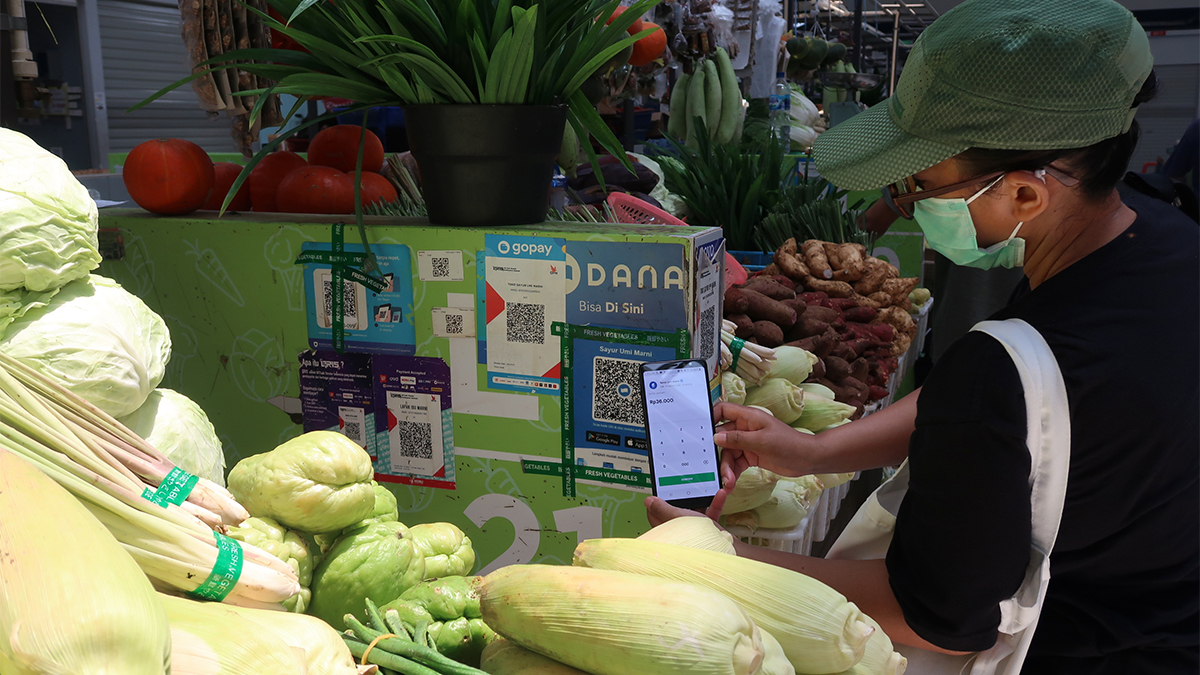The UNCTAD-led eTrade for all initiative marks a new milestone with the enrolment of the International Chamber of Commerce as its principal private-sector counterpart.
© Toto Santiko Budi/Shutterstock | Customer uses cashless payment technology to buy vegetables at market in Tangerang, Indonesia.
A new strategic partnership between the International Chamber of Commerce (ICC) and the eTrade for all initiative seeks to strengthen efforts towards more inclusive development outcomes from the digital economy.
The partnership was announced on 25 April during the UNCTAD eCommerce Week held in Geneva and online, following a vetting process among the initiative’s 34 members.
UNCTAD Secretary-General Rebeca Grynspan welcomed the new role of ICC and said: "I am very proud to lead this unique global partnership that leverages each partner's contribution to make the digital economy work for all.”
Ms. Grynspan added: “By partnering with ICC, we will better leverage a global network of businesses and resources that are active on the ground to help us boost our support and assistance to developing countries for greater impact."
Role and scope of new partnership
The eTrade for all initiative serves as a global helpdesk for developing countries to bridge the knowledge gap on e-commerce. It provides access to information and resources, promotes inclusive dialogues on e-commerce and the digital economy and catalyses partnerships.
The new cooperation will provide a trusted, neutral and global channel to bring private sector voices to the discussion and enhance coordination.
It will enable consistent, systematic and strategic engagement of micro, small and medium-sized enterprises (MSMEs) across all sectors, which are affected by the increased digitalization of economies in developing and developed countries.
ICC Secretary General John Denton said: “I've been incredibly impressed by the vision and track-record of UNCTAD’s eTrade for all initiative over recent years. This new partnership provides an opportunity to take this important capacity-building work to a new level.”
He said the partnership would harness the expertise of businesses throughout ICC's network to deliver targeted support that unlocks the enormous potential of digital trade across the developing world.
“We look forward to working as a trusted partner to UNCTAD and governments to tackle key bottlenecks to digital development, driven by our overarching commitment to enable trade as a driver of peace, prosperity and opportunity for all," Mr. Denton added.
ICC will serve as the main private-sector counterpart and ensure effective interaction between businesses around the world and eTrade for all. This will involve regular information sharing and ongoing cooperation activities by its members.
Representing more than 45 million companies in over 100 countries, ICC is the world’s largest business organization. It promotes international trade and investment as vehicles for inclusive growth and prosperity through a mix of advocacy, solutions and setting standards.
Digitalization is putting pressure on developing countries
The growth of e-commerce has been massively accelerated by the COVID-19 pandemic as people have turned to digital platforms to shop online, with the global share of online retail sales of total retail sales rising from 16% in 2019 to 19% in 2020, a level sustained in 2021.
While digitalization offers immense potential, it also poses huge challenges to people and businesses, and not everyone has been able to harness the potential of digital opportunities.
Only 27% of people in least developed countries (LDCs) use the internet, and while up to 8 in 10 internet users shop online in developed countries, that figure is less than 1 in 10 in most LDCs.
Many small businesses in developing countries are unable to go online due to weaknesses in the digital ecosystems of their countries.
People and countries that are less prepared for the digital economy risk falling further behind, highlighting the urgent need to bridge gaps in digital readiness.
Building the capacity of low- and middle-income countries to participate in and shape the digital economy will require smart partnerships to avoid duplication of efforts and to make effective use of scarce resources.
This new collaboration between the eTrade for all initiative and ICC is an important step in this direction.
The eTrade for all initiative was launched in 2016 with 14 partners to make e-commerce and the digital economy more inclusive.

